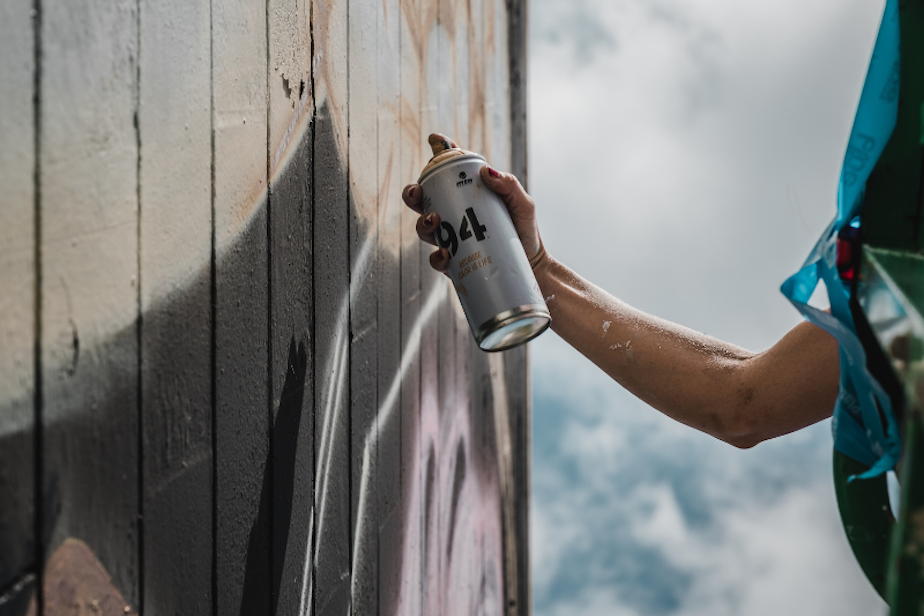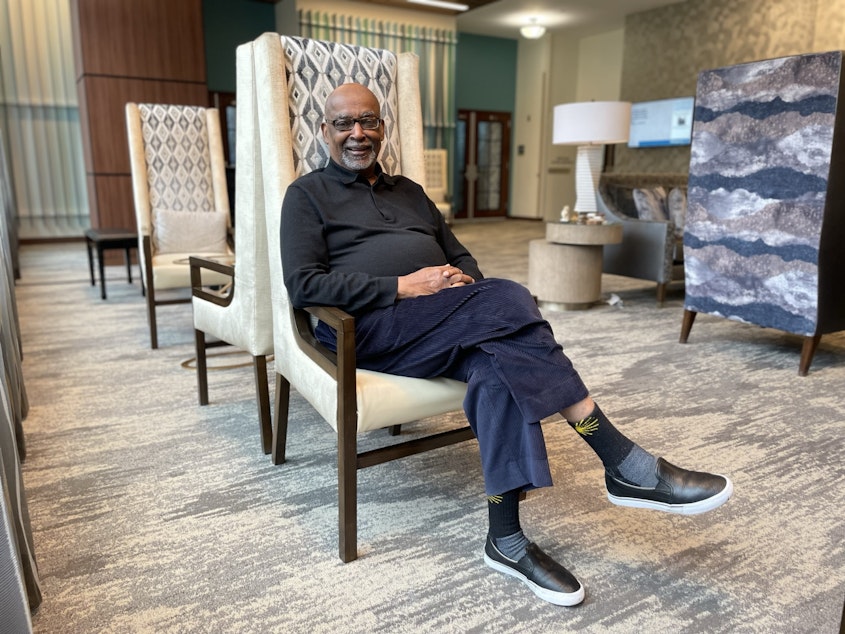What does graffiti have to do with Seattle summer traffic?: Today So Far

- While I-5 through Seattle is shutdown for repairs, it will also be getting a clean up.
- A study into Seattle's soda tax shows that the economic benefits outweighed the costs.
- Seattle and Tacoma police departments are facing steep challenges.
This post originally appeared in KUOW's Today So Far newsletter for July 14, 2022.
A recent move prompted my wife Nina and I to make quite a few trips along I-5. And that further prompted a few observations.
"I like the hot dogs," Nina said while we were driving through Seattle.
"What?" I replied, as I was distracted trying to make a song out of the frequent jolts from driving over expansion joints in the road. Driving over them makes it sound like your car is going to fall apart, so I figured I might as well make it fun.
"The graffiti," she said, noting that the spray painted hot dogs under a few overpasses were "kind of cute."
We got to know some of those tags well on those drives. However, their time is up. Same could be said for the expansion joints. The Washington State Department of Transportation is shutting down southbound I-5 through Seattle over a series of weekends (including this upcoming weekend) to repair and replace the expansion joints. And while the freeway is shut down, crews will be painting over the graffiti along the way. This means two things: fresh canvas; and also Seattle traffic is going to suck this summer. Plan accordingly. Read more here.
Sponsored
I've always had mixed feelings about Seattle's soda tax. On one hand, I'm all about getting rid of sugar-loaded drinks and food (sugar is everywhere). So anything to discourage the consumption of soda is a good thing in my mind, and a tax does just that. Plus, that tax revenue goes to fund local food banks and programs that get fresh, healthy food to people who generally have difficulty getting it, like low-income families.
On the other hand, a voice in the back of my mind always reminds me that people have to buy this terrible stuff to fund all the good. So while a family is getting healthy food over here, someone has to be popping open a soda over there.
Perhaps cognitive dissonance like that is why the University of Washington has been watching how Seattle's soda tax has played out. A recent study looked at the economic results of the tax (not the health outcomes). It ultimately concludes that the tax "resulted in large net transfer of funds to lower income population." At the same time, it finds that "the lowest-income households paid a larger proportion of household income on the tax, unsurprisingly." But more benefit was gained than spent, so overall, it's "an effective nutrition policy." Read more here.
I'm not sure if the study looked at the economic impact of long-term health consequences of consuming the taxed soda, from diabetes to obesity, heart disease and so on. So my suggestion to folks struggling with the same back-and-forth internal debate as me: If you have a couple extra bucks, buy a soda at the store and donate that tax money. Then promptly pour it out.
Police departments are facing steep challenges these days, as is evident in Seattle and Tacoma.
Sponsored
In Tacoma, the city has been facing rising street crime. That has spurred Chief Avery Moore to develop a new crime reduction plan, which he presented this week. In short, it proposes near term, midterm, and long term plans that will: increase police presence in "crime hotspots;" develop strategies for areas with higher crime rates; and intervene with high-risk offenders. Such intervention means communicating with local gangs about alternatives to violence. Read more about that here.
In Seattle, Mayor Bruce Harrell has a new plan for police recruitment and retention amid a severe shortage of officers. It starts with hiring bonuses — up to $30,000 for officers coming from other departments, and $7,500 for new recruits. They mayor has expressed a mission to bring new officers to Seattle, who reflect the values and approach to policing that the city promotes. His incentive proposal will come with a $1 million price tag. That level of spending will have to come with council approval. And it is unclear if council members will be on board with the plan. Councilmember Lisa Herbold told KUOW that she would like to see more effort from the mayor's office to develop policing alternatives. Read more here.
AS SEEN ON KUOW

Former Seattle Mayor Norm Rice at the retirement home tower where he lives on First Hill. Rice recently spoke with KUOW about the plans he helped implement in the 1990s, which set in motion Seattle's growth over the past three decades. But Seattle is now looking at how it wants to grow in the years ahead, as more and more people move to town. (Joshua McNichols / KUOW)
Sponsored
DID YOU KNOW?
Seattle once had a graffiti detective. Chris Young was assigned to the beat to investigate and document graffiti across the city over the past decade or so. Seattle no longer has a graffiti detective. Such incidents are investigated through SPD's general investigations unit.
But during his time on the beat, Det. Young discovered a lot of myths surrounding graffiti. That's why he started a website called "Graffipedia." Some of it is Young's opinion, and some of it is data collected from Seattle. For example, some assume a lot of graffiti is gang related. Not true. There are a range of motivations behind graffiti, and different types of graffiti. In fact, it has more to do with an adrenaline-seeking subculture which operates under its own set of rules.
I spoke with Det. Young a few years back. At the time, he told me that taggers, statistically, are an average of 23 years old, white (77%), male (89%), and are primarily middle class.
ALSO ON OUR MINDS
Sponsored

Black gun owners have mixed feelings about the Supreme Court's concealed-carry ruling
The Supreme Court's recent decision to guarantee the constitutional right of people to carry firearms in public spaces for the purpose of self-defense has become a complicated issue for Black Americans. Black Americans overwhelmingly vote Democratic but have emerged in recent years as the fastest-growing demographic of gun owners.
Updates and more on KUOW's Today So Far Blog

